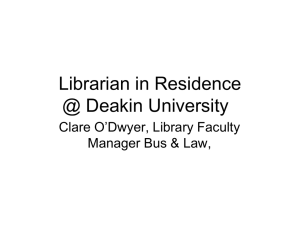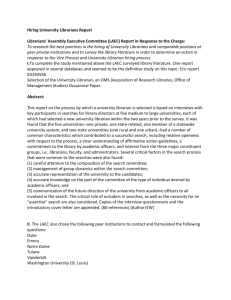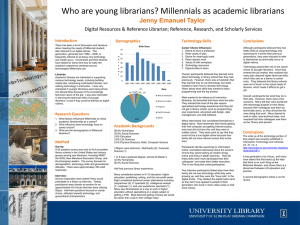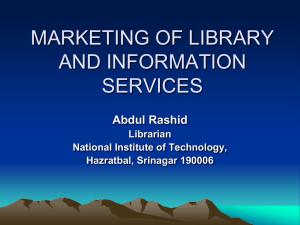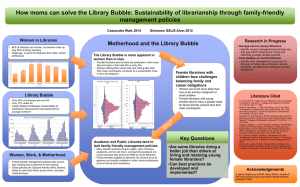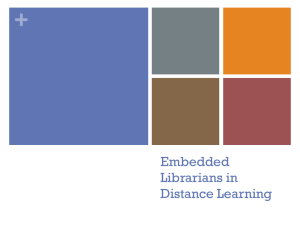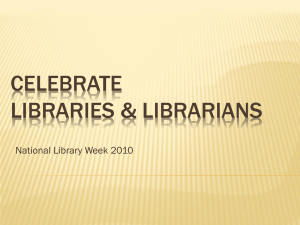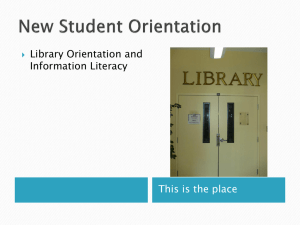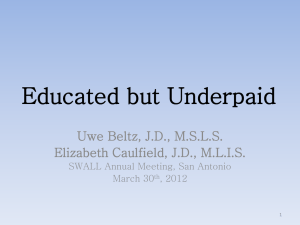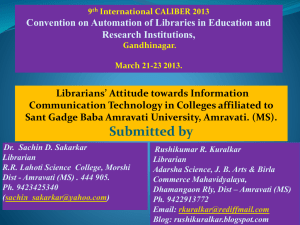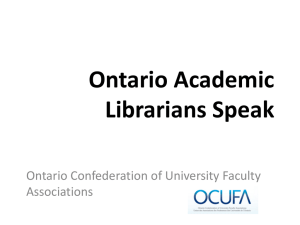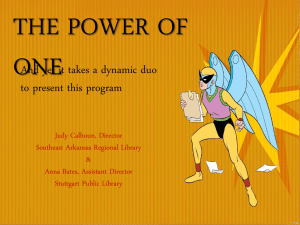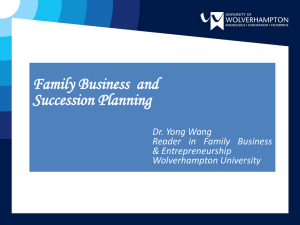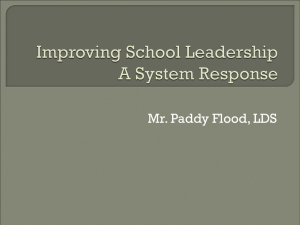Hiring for 21st Century Libraries
advertisement
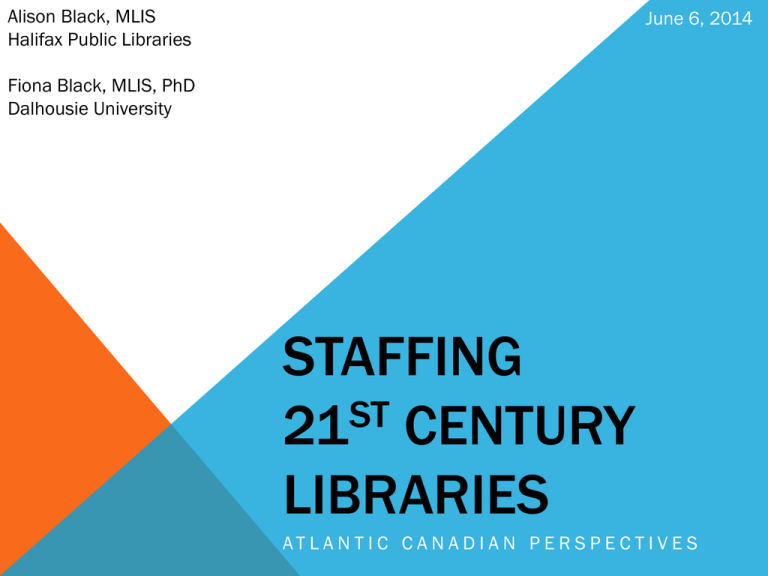
Alison Black, MLIS Halifax Public Libraries June 6, 2014 Fiona Black, MLIS, PhD Dalhousie University STAFFING ST 21 CENTURY LIBRARIES AT L A N T I C C A N A D I A N P E R S P E C T I V E S OVERVIEW • Informal survey from APLA 2013 • Study design and objectives • Free write • Interview findings and questionnaire results • Conclusion and feedback INFORMAL SURVEY FROM APLA 2013 Do your organization’s HR policies and procedures lead to hiring staff who will be change agents for your organization? “No.” “No.” “No!” “Yes and no. We are often in a crisis situation where we need to fill a vacancy….” “The makeup of our selection committees often leads to the recruitment of candidates who are the same as the people we already have.” “Strict policies often [don’t] leave room to consider this aspect.” INFORMAL SURVEY FROM APLA 2013 Do your organization’s HR policies and procedures make clear to staff the value of all forms of diversity in hiring? “No.” “No.” “No!” “No--we are very strict on our requirement in terms of experience, language, etc. but we never talk about diversity.” “Yes, I think so.” INFORMAL SURVEY FROM APLA 2013 Does your organization have HR policies and procedures that guarantee the provision of professional development support to all staff? “No [for] support staff; yes [for] librarians (via collective agreement).” “Non-professionals—money allocated, no written policy.” “No money to let staff take part in…language training or other courses.” “In theory yes, but there is not usually specific money budgeted for PD, unless it is in-house training.” “In my 3+ years in my present job, I’ve been offered no PD opportunities….” STUDY OBJECTIVES To analyze, compare, and evaluate hiring policies and practices regarding professional librarian positions in selected Atlantic Canadian public libraries. STUDY DESIGN • Interviews with library directors and managers • Online questionnaire for professional librarians • Content analysis of library hiring policies and procedures *Follows policies and procedures of the Social Sciences & Humanities Human Research Ethics Board of Dalhousie University GOAL OF 3-STAGE DESIGN To determine the congruency among the strategic visions of library directors, the current HR practices within their organizations, and the experiences of professional librarians in terms of their own employment. INTERVIEWS WITH LIBRARY MANAGERS 13 interviews (and counting!) Purposive sampling Urban, rural / regional, and provincial public library systems Managers from public library systems in New Brunswick, Newfoundland & Labrador, Nova Scotia, and Prince Edward Island Executive Directors, CEOs, Chief /Regional Librarians Regional Directors, Division Managers, Department Heads FREE WRITE Please review the questions that were asked of library CEOs and managers around Atlantic Canada. Which question is most important to you? Which question is most important to your organization? QUESTIONNAIRE FOR PUBLIC LIBRARIANS Personal experiences surrounding librarians’ own successful applications, current roles, and future positions Emailed invitation with link to online questionnaire, via APLA listserv Opinio survey software Secure Dalhousie University servers Survey consists of 26 open-ended & closed questions, and takes 10-20 minutes to complete https://surveys.dal.ca/opinio/s?s=22104 STRATEGIC PLANNING “A good hire strategically will not only fill the current job position, but has the potential to move that job position and that position in the overall organization to the next level.” “You want someone who is a strategic thinker, rather than an expedient thinker.” “Is this someone who has potential to…move up in the organization and even run the department some day?” DRIVERS OF HIRING “Before you hire, is that job still required? Does it need to be changed slightly before you go ahead and do a posting?” “We’re so lean that as soon as position is vacant it has an impact on service.” “We’re downsizing, losing people as opposed to hiring new people.” “Sometimes it is retirement, so it’s replacing—and certainly needs change.” NEW LIBRARIANS: EDUCATION “So obviously the Master’s degree.” “We believe that to have a strong library system we need true expertise.” “Because people with library degrees have embraced the profession, as far as their educational pursuit, we believe they bring something extra to the organization.” “You can teach people some basics but it comes back almost to those personality traits…being open, having some common sense, understanding that when you graduate from library school it’s a beginning not an end.” NEW LIBRARIANS: EXPERIENCE “Supervisory experience, which most younger people don’t have….It become a bit of an issue for a younger person supervising an older personal who’s been here forever.” “It’s sad that people no longer have experience of multiple employers.” “People don’t want to leave the Maritimes, they want to stay where they are, so they’re a little handicapped in that way and there aren’t very many systems to work in.” “We will consider a candidate with less experience…and then the rate of pay will be a little bit lower until the person reaches the level of the position.” NEW LIBRARIANS: QUALITIES “For an entry level position I think the personal qualities are considered way more important [than experience].” “They have to be willing to dig in and do what needs to be done….” “It’s important…that people be adaptable and flexible….in a smaller library system like this, they wear many hats.” “Look for eye contact and so enthusiasm, some energy and true interest in the organization….” “I’m looking for the curiosity and a lively mind…[someone who] is interested in learning and growing, someone that you can see acquiring skills and developing in a job.” INTERNAL VS. EXTERNAL SEARCHES “It’s a lot of civil service gymnastics….” “We have to interview the internal candidates first and if we reject all of those then we are able to go outside.” “People who are currently working in the public library [system are] familiar with it, have knowledge of the service and have a commitment to the service…” “But the disadvantages are tunnel vision…especially if they’ve only ever worked in one library.” “I think it’s bad to hire people, personally, with library degrees for clerical positions….” “You’re not going to get a lot of people applying for a half-time position from outside the province….” INTERNAL VS. EXTERNAL SEARCHES “All the applicants for the position were internal as preference is given to members of the union. Only if everyone failed the interview would external candidates even be considered.” “I was told to get my foot in the door as soon as possible and I did that by working as a clerk while still in library school and it was excellent advice - I had a full time, permanent librarian 2 position ten months after graduation.” “In our library system, most permanent positions are internal competitions.” ENTRY-LEVEL POSITIONS “If you have no entry level positions, you have no future senior librarians.” “If we don’t bring back young librarians…when they graduate or shortly after they graduate, it’s almost impossible to bring them back later.” “It allows us to bring young people with potential and the right skills and competency, to train them, grow them, and place them somewhere where they have a chance to become permanent.” “One of the reasons they didn’t stay was not just the money, but they weren’t really getting to utilize their full skills….” “We’re losing librarians, young librarians, entry-level librarians because of salary scale for Librarian One is too low.” ENTRY-LEVEL POSITIONS “The lowest librarian levels we have at this point are [Librarian] 3s.” “We haven’t had to go to people just straight out of library school who have no experience in anything.” “We realized eight or nine years ago, I think that we really didn’t have any entry level librarian positions so there was no way for anyone new with no experience to get into the system, because the librarians jobs had all been loaded with supervision. Once you add supervision it’s not an entry level anymore.” “You gotta sit tight.” PROFESSIONAL DEVELOPMENT “We preapprove a course, whether it be a library tech or Master’s degree. They pay for it. Once they pass, they get reimbursed up to seventy five per cent of the course fee.” “We have a Training and Developing Fund….[We] always have people who are taking courses.” “Personally I think people are responsible for their own education. We have done leaves of absence though.” “We haven’t been to any kind of conference for years.” HIRING FOR DIVERSITY “There’s a growing need to have more and more staff that are multicultural and in many ways the future of the library depends on you continuing to change and adapt with your community.” “We don’t specifically state, but I mean because it’s a government position, when people come to work here it’s understood that it’s open to anyone.” “The best person for the job is the best person for the job.” HIRING FOR DIVERSITY “I would like to mention that there are a grand total of 3 people of color in the library staff of the [my] library region…It is something to look into....Are people hiring diversely?” SUCCESSION PLANNING “We have increased the number of our librarians, I know in many places they’ve reduced it, but…that’s not the direction we’re taking….” “The reason we focus so much on [librarians who are from our province] whenever possible, is that the retention…is much greater.” “I always think when I hear library directors say, ‘I don’t have anybody capable of moving into management’ that it’s the organization that’s really failed….” “So a beginning librarian at [this library] will make just under forty thousand dollars and that’s not enough with a student loan. And that’s really not enough with a Master’s Degree.” SUCCESSION PLANNING “We are in a 'sticking your finger in the dyke position' so not able to engage in succession planning.” “What is happening with Public Libraries in NL is very sad ...there is a lack of leadership and understanding of the value of public libraries. Funding is very much at the whim of the current provincial government.” “My assistant manager, whole I was “grooming” to take over for me has been laid off-very depressing to see that a lot of my hard work over the past 35 years may go ‘down the tubes’.“ “We've done [succession planning] well with some positions and not so well with others. My current transition would be one example of not doing it really well. It took almost a year for me to settle officially in my current role.” SUCCESSION PLANNING: MENTORING “I make sure I meet every [new librarian] in the province. I go meet them at some point in their first six months and have a discussion with them about how they enjoy their job.” “We are responsible to provide you opportunities and coach you and mentor you.” “There’s, of course, all kinds of special projects and appointing them on committees….” SUCCESSION PLANNING: MENTORING “We are developing "Knowledge transfer plans" for each position. I know that our director usually has someone in mind to fill positions as retirements arise, and grooms potential candidates (usually in an informal manner).” “Human resources coaching, branch manager encouragement and support through conversations and sharing of information.” “A senior librarian encouraged me to apply after having hired me for a tech position to get me into the system.” “[My director] takes great measures to identify our strengths and career goals, wanting to ensure our desired professional path within the organization as much as possible.” SUCCESSION PLANNING: DO YOU MENTOR? “[I] provide training opportunities, invites to community meetings, appointments to committees.” “Many of the library assistants and clerks have their MLIS so I am often asked for application or interviewing tips.” “I provide advice and support the continuing education of staff. Also encourage participation in library organizations and on special committees providing financial support and encouragement.” “I'm not sure that I'd call anything I do intentional career mentoring. Maybe because I've never been mentored?” SUCCESSION PLANNING: CAREER PLANS “I presently do not see a future as a working professional in my current organization, and possibly not in the library/information field.” “To advance to a larger public library system.” “Obtain a permanent position as branch manager or possibly move to another system that could offer more opportunities for advancement.” “I would like to transition to an academic environment, but it appears that public library experience is not highly regarded by those who hire for academic institutions, at least in Atlantic Canada.” SUCCESSION PLANNING: CAREER PLANS “I am committed to this geographic area and I like the organization and where it is going.” “I work for a fantastic organization, in a wonderful city. I love my job and the people I work and interact with.” “I worked as the Deputy Chief Librarian for over 5 years when the Chief Librarian decided to leave. She & I had worked closely together for years so I knew a lot of the responsibilities already.” “Might be interested in looking at management positions by then, but I'm not convinced. “ HUMAN RESOURCE CHALLENGES “It’s almost a revolving door [in rural areas]…the community may start to question…why we’re putting librarians there, if we cannot keep them long enough.” “It can be two and a half, three years before a person becomes permanent.” “There’s things that are falling through the cracks….Now I think higher priority items are on the bottom of the to-do list that you’re never going to get to.” “[The managers are] all talking about retirement—it’s all within a year or two kind of thing.” “Recruiting and finding qualified candidates….We don’t have a large pool to choose from….” HUMAN RESOURCE CHALLENGES “I feel like my organization expects librarians to take on a high level of responsibility and to deliver a high level of performance, but does not provide commensurate remuneration. They try to excuse this because of the relatively low cost of living in the province….” “Harsh budget cuts decimated our librarian positions and those who remain now do all of that work as well as their own original jobs.” “We need far more staff than we currently have. We are overworked and underpaid (as are most people) and most of us continue in our positions for a love of what we do and our patrons.” CONCLUSIONS • Keys to succession planning: • Entry-level positions • Assistant/deputy manager positions • Mentoring • Hiring for diversity: • Are employment equity policies strong enough? • Discrepancies among regions in terms of staff support, salaries, and opportunities for advancement. QUESTIONS & COMMENTS I want to hear from you! https://surveys.dal.ca/opinio/s?s=22104 blacka@halifax.ca
